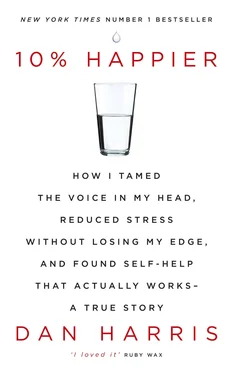Kidding—and ethnic stereotypes—aside, I took my dad’s maxim very much to heart. Straight from childhood, I was a frequent mental inventory taker, scanning my consciousness for objects of concern, kind of like pressing a bruise to see if it still hurts. In my view, the balance between stress and contentment was life’s biggest riddle. On the one hand, I was utterly convinced that the continuation of any success I had achieved was contingent upon persistent hypervigilance. I figured this kind of behavior must be adaptive from an evolutionary standpoint—cavemen who worried about possible threats, real or imagined, probably survived longer. On the other hand, I was keenly aware that while this kind of insecurity might prolong life, it also made it less enjoyable.
Once at ABC, though, any attempts at balance went directly out the window. I was young and out of my league; I had to work triply hard to prove myself in the face of widespread institutional skepticism. (One night, as I was standing in front of the camera waiting to go live on Peter’s show, his executive producer got into my earpiece and said, “You look like you’re getting ready to pose for Bar Mitzvah pictures.”) To compensate, I was pitching stories constantly; I was ruthlessly self-critical; I was willing to work nights, mornings, and weekends—even if it meant skipping important events (such as friends’ weddings and family gatherings) in order to get on the air.
The news division was a fertile environment for this kind of intensity. In fact, people here were fond of repeating a famous quote from the legendary White House reporter Helen Thomas, one I embraced with gusto: “You’re only as good as your last story.” Getting on the air was not easy. On any given night, World News ran six or seven taped pieces from correspondents, and most of those slots went to the people covering specific beats such as the White House. Meanwhile, there were about fifty other correspondents vying for what remained. I set up an endless mental tape loop: How many stories have I had on this week? What is the state of my relationship with Peter right now? What else do I have coming up?
For the first year or so on the job, my strategy was to focus mainly on producing what we called “back of the book” pieces, stories that aired after the first commercial break. These ranged from investigations to in-depth pieces to fluffy features. I figured that given all the competition to cover the big, breaking news, this was the smart play. Aside from the aforementioned investigations, I reported on the dotcom boom and bust, and did colorful features on the periphery of the Bush-Gore recount battle in Florida.
About a year into my tenure, Peter summoned me to his book-lined office to discuss a new assignment. He was settled behind an imposing dark wood desk as I sank uncomfortably into his overstuffed couch, which was clearly designed by the same person who invented such medieval torture devices as the iron maiden and the pear of anguish. He made an announcement that was both unforeseen and unwelcome. He wanted me to take over ABC’s coverage of religion. This beat was a top priority for Peter. He had recently hosted a pair of highly rated, well-reviewed prime-time specials about the lives of Jesus and Saint Paul. He had also personally overseen the hiring of the first full-time religion correspondent in the history of network news, Peggy Wehmeyer. But Peggy, a comely, blond evangelical from Texas, was leaving now, and Peter had decided I was going to take over her responsibilities. I tried to issue some sort of a protest about being a devout atheist (I didn’t have the guts to tell him I couldn’t care less about the subject), but he was having none of it. This was happening. End of discussion.
Several months later, I was sitting in a puddle jumper on the tarmac in Fort Wayne, Indiana, having just finished shooting a story about church youth groups. A guy in the front of the passenger cabin hung up his cell phone, turned around, and told everyone that the Twin Towers were on fire. It was September 11, 2001, and suddenly every civilian airplane in the country was grounded. I was no longer heading back to New York anyway. My own cell phone rang, and my new marching orders were to get myself to Shanksville, Pennsylvania, where United Flight 93 had been brought down by passengers who stormed the cockpit.
I disembarked, rented a car, and with my producer alongside me, began the four-hundred-mile trek eastward. I spent those seven hours in the car experiencing what was, for me, a new and confusing breed of misery. Like all Americans, I was furious and scared. But there was also an overlay of self-interest. This was, in all likelihood, the biggest story of our lifetimes, and here I was stuck driving a “midsize vehicle” across the breadth of Ohio, helplessly listening to the news unfold on the radio. I knew Peter would be in his element, in full-on clarify-and-comfort mode, and it made me feel physically ill not to be part of the team reporting on—and explaining—this news to the country. I knew now that “back of the book” would no longer cut it for me.
I reported from Pennsylvania that night, and then drove the rest of the way back to New York, where I essentially moved into the Tribeca Grand Hotel, just blocks from Ground Zero. The police had closed off much of Lower Manhattan, and since I lived and worked uptown, the only way to cover the story was to stay nearby. This boutique hotel, with its tiny rooms, exposed wrought iron elevator shafts, and huge lobby lounge (normally filled with boulevardiers sipping overpriced cocktails—now eerily empty), was an incongruously chic spot from which to cover the deadliest terror attack ever on American soil.
I was right about Peter. His round-the-clock anchoring during those terrible days was nearly universally lauded, and under his guidance, I produced stories about the anguished crowds visiting the rubble at Ground Zero, and also the troubling number of attacks on innocent Muslims around the nation.
A few weeks later, as the maelstrom of Ground Zero coverage began to abate, I was back uptown in my office one afternoon when my phone rang. The caller ID read foreign desk. The voice on the other end of the line said, “We need you to go to Pakistan.” A pint of dopamine was released into my brain. After I hung up the phone, I actually paced around the room, pumping my fist.
This, fittingly, was how I began the most dangerous and formative years of my life: with a series of douchey gesticulations. I lurched headlong into what would become a multiyear adventure—during which I would see places and things that I never would have had the audacity to imagine as a shaggy twenty-two-year-old reporter in Bangor. I was floating on a wash of adrenaline, besotted with airtime, and blinded to the potential psychological consequences.
Prior to this first trip to Pakistan in October of 2001, I had never been to the Third World, unless you count a visit to Tijuana in the 1980s when I was on a Teen Tour. So when I boarded the flight for Islamabad the day after that call from the Foreign Desk, I had no idea what to expect. I arrived to what my British friends would call a “proper Star Wars scene.” Baggage claim was teeming with bleary-eyed passengers, bored-looking cops, and greasy, brown jumpsuit–wearing baggage-handling hustlers. I was the only Westerner in the hall. A local driver met me on the other side of customs, holding a sign with my name on it. Outside, the morning air was hazy, warm, and smelled vaguely of burnt tires. The highway was clogged with huge, brightly decorated cargo trucks whose drivers were constantly beeping their tinny, melodic horns. I later figured out that people in places like this didn’t honk to get other drivers out of the way so much as to simply alert people of their presence, like a pulse of sonar. I had never felt so far away from home before.
Читать дальше












